The business of pawn
12/6/2023
A Quality Pawn and Jewelry, 1135 Army Post Road, Des Moines, is owned by Adrian Welch.
Weekdays are typically quiet at A Quality Pawn and Jewelry at 1135 Army Post Road in Des Moines. The owner, Adrian Welch, says she only sees up to five customers on any day of the week. But she knows all her customers and wants the best for them.
On a Wednesday afternoon in November, one of her pawning customers came in to make her $40 monthly payment, the same amount she has been making on her $200 loan for the last two years. Welch welcomed her by name, asked how her family was doing and inquired about her plans for the holidays. As a courtesy, Welch reminded her that she accepts CashApp or Venmo in case of winter road conditions. If Welch cannot make it in for the same reason, she’ll update her customers through text.
“I try to make it a personal (connection),” Welch said. “I want people to come in and not feel bad that they have to borrow money…You’re coming in at a low part of your life…I’ve been there.”
This is the case for Des Moines’ pawn shops. First and foremost, they are businesses that have to adhere to laws and regulations to turn a profit. But they also serve as financial institutions for members of the community in need.
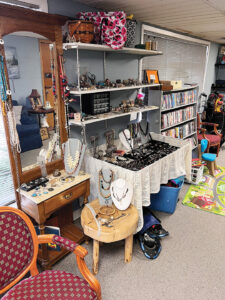
A variety of pawned items are displayed at A Quality Pawn and Jewelry.
Industry trends
“Pawn shops, to me, are people getting fast, short-term loans,” said Welch. “That has been on the rise… Volume-wise, I’m doing more this year than I’ve probably done in 20-some years. But I think that has to do with the economy.”
Welch went on to explain that, as prices go up, so does the need for quick cash. Today, many of her customers are coming in after getting laid off to make ends meet. For a pawn shop, that means more loans to hand out and more interest to collect.
However, Steve Kouri, owner of Solar Loan and Sales at 3311 Ingersoll Ave., sees the opposite.
“We do the best when the economy is booming,” said Kouri. “It may seem counterintuitive, but people have excess money to spend and, also, they may pawn based on spending habits versus direct need.”
Kouri explained that, during times of economic strength, somebody might go out and pawn to purchase concert tickets. They do so knowing they can rely on their steady job and income to repay their loan. During the height of the pandemic, customers pawned based on immediate needs and did not have the secure income necessary to pay off those loans.
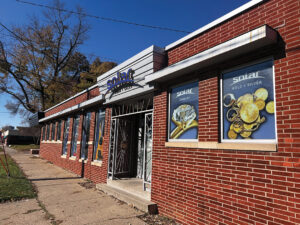
Solar Loan and Sales, 3311 Ingersoll Ave., Des Moines, is owned by Steve Kouri.
“The loan value may go up; but, overall, business is better when the economy is better,” Kouri said.
The nationwide pawn industry has two publicly traded companies: EZPawn and FirstCash. Since the pandemic, their stock prices have gone up. However, the number of small pawn shops has gone down. According to market research group IBISWorld, the number of pawn shop businesses in the U.S. declined 1.7% from 2021 to 2022.
Jeffrey Pocock, owner of The Pawn Store at 3005 Douglas Ave. in Des Moines, can attest to this decline.
“When I came to my current location 26 years ago, there were four other pawn shops within a 1.5-mile radius,” he said. “I’m the only one left.”
Part of the reason has to do with buying.
“Buying has backed off significantly,” Pocock said. “[Pawn shops] are having to be more selective about what they purchase because everybody’s got inventory now.”
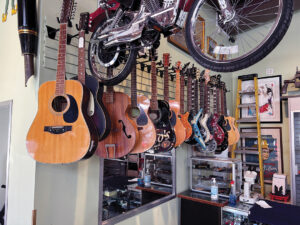
The Pawn Store has everything from video games to bicycles, sporting goods, musical instruments and more.
Pocock has had to turn away customers, just because he is not able to turn their items into cash. He has noticed that, as time goes by, the quality of inventory declines. The value of all things brought into his store continues to decrease. He says there is no sense in him buying or pawning something that will never leave his store. On his way to retirement, Pocock is in the process of liquidating everything The Pawn Store owns. Some items are easier to sell than others, like unique firearms, higher-end watches and diamond rings.
This is why Welch decided to primarily focus on jewelry. Random items, like tools, depreciate quickly, and she has difficulty selling them. However, she can quickly sell gold, diamonds and jewelry. In fact, A Quality Pawn and Jewelry only pawns and sells jewelry with the occasional coin, silver or newer electronic goods. Welch uses the Rapaport for diamond prices and the daily gold price to determine the value of items.
In recent years, Pocock has seen more and more items being forfeited due to failures to pay off loans.
“I would say, currently, more people forfeit their goods because I think times are tough,” Pocock said. “It’s always been the case, but more so now… I think it’s easier to acquire the funds when you’re in need without taking into consideration that you have to pay that money back, and then some.”
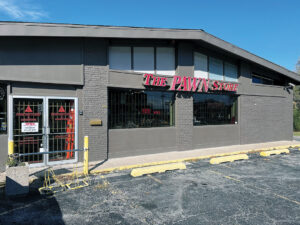
The Pawn Store, 3005 Douglas Ave., Des Moines, is owned by Jeffrey Pocock.
Laws and regulations
In Des Moines, pawnbrokers have their own section in the city’s municipal code. Like most other businesses, pawnbrokers must also obtain a license, display the license and renew it. But there are plenty of regulations pawn shops must adhere to that other retail outlets do not.
For starters, they are limited to certain hours. Section 30-304 of Des Moines’ municipal code sates they are prohibited from purchasing, receiving or surrendering any property between 6 p.m. and 8 a.m., Monday through Saturday. They are completely prohibited from doing so on Sundays.
Another hurdle for business, Section 30-304, prevents the sale of those items within 15 calendar days after the receipt and report of any property. The 15-day hold period is to give the police department time to identify and locate any stolen goods. But, there is another system in place that already prevents that.
After purchasing or receiving any item, Section 30-301 requires pawn shops to immediately enter the following information into Leads Online, an electronic reporting system available to the Des Moines Police Department: date and hour of the transaction; the amount paid, advanced or loaned for the item; a detailed and accurate description; model or serial number; a digital photograph of the item; and the name, address, date of birth and Iowa driver’s license number (or Iowa identification number) or social security number of the person selling or handing over the item.
To further ensure that pawn shops are not buying stolen goods, each owner usually has a good read on whether the item is truly in the legal possession of the customer.
For example, if a customer brings a camera to Kouri at Solar Loan and Sales, he’ll ask them about the technical components, whether it’s a Canon or a Nikon and even how to operate it.
“That, of course, is one easy way,” Kouri said. “Being polite about that and direct, just asking normal informational questions about the item.”
If a pawn shop does purchase stolen goods, or the police suspect there to be stolen goods on the property, DMPD has the right to enter and search the licensed premise, with or without a warrant, according to Section 30-305.
The Pawn Store’s relationship with the police department has caused Pocock frustration for quite some time; however, he says that the relationship between Des Moines area pawn shops and the DMPD has moved towards a more positive one, which he attributes to a change of personnel.
“I heard my safe open one time, and I walked back there, and there’s a detective… rummaging through my safe,” he said.
One time, Pocock says he found an officer going through all of his DVDs because they were not individually tagged. Pocock reasoned it’s ridiculous to tag and ID each individual DVD after someone brought in hundreds, even though he was supposed to.
His frustration with regulations does not end there. He questioned why anyone with stolen goods would sell to a pawn shop if they are required to give so much information. Pocock reasoned they might as well go to online platforms or antique shops, where they do not require the same information. However, Des Moines’ municipal code holds “secondhand goods dealers” to the same standards.
“It’d be so much more challenging to be a crook in this business because it’s so challenging in general,” Pocock said.
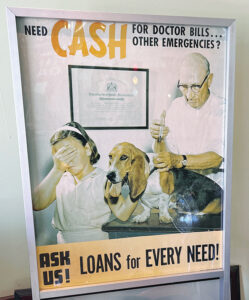
Addressing the stigma
“I don’t want to say I was ashamed, sometimes embarrassed, that I worked at a pawn shop because I always knew they looked at you a certain way,” said Welch.
Working in the pawn industry comes with one big con: the public image.
“I most definitely think there is (a stigma), typically until they go to (a pawn shop),” said Pocock.
And it’s true, walking into a pawn shop is like walking into an antique shop or reseller.
“I mean 40 to 50 people come in a day,” said Kouri. “You just always try to treat them with respect and make it a welcome place to come in. And you realize you’re always struggling not to fall short of that with people that are in need. It’s difficult because their frame of mind is not always the greatest. And maybe the items don’t warrant what they’re after, so that’s kind of one tough part of the business.” ♦





















